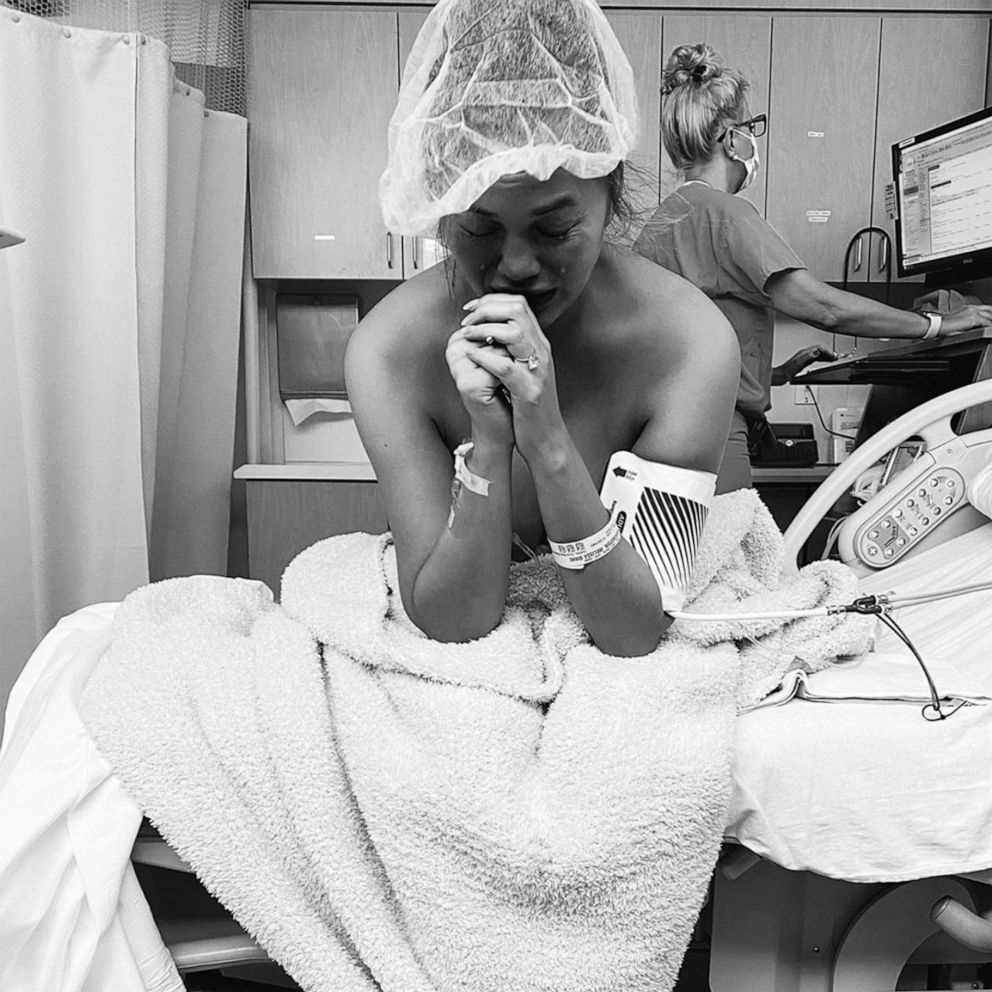Big Little Feelings' Kristin Gallant: Why I shared my miscarriage with 2 million people
"We... unequivocally should be sharing our pregnancy in the first trimester."
As a parenting coach with more than 2 million followers on Instagram, Kristin Gallant of Big Little Feelings is used to solving some of the trickiest child-rearing conundrums. But when she had a miscarriage in late August, Gallant, a mother of two, was left devastated and searching for answers of her own.
Now, in honor of National Pregnancy and Infant Loss Awareness Month, Gallant is sharing more about her experience with "Good Morning America." She hopes to help others who are grappling with loss.
Six weeks ago, I had a miscarriage. It rocked me unlike anything I've ever known.
When we got a positive pregnancy test, my husband and I were in utter shock. We were seeing a fertility specialist and planned to start IVF the following month.
But our joy quickly turned to fear as we learned my HCG level wasn't rising as quickly as it was supposed to and I was spotting. Our doctor prepared us for the worst. Then, after three tortuous weeks, I went in for my seven-week ultrasound and we saw the most beautiful sight: a healthy-looking embryo with a beautiful, strong heartbeat. We sobbed. We hugged. We got a printout of our baby. I breathed a sigh of relief.
And just like that, it ended.
A few short hours after that ultrasound, I lost the baby. A "complete miscarriage." "No sign of pregnancy," the ER doctor said. Nothing left behind.
I remember thinking, "Now what?" No one prepared me for this. No one talked about this even being an option.
When there is a birth of a baby, there is joy, there is an announcement, there is a meal train, there are texts, and for many, there is maternity leave. When there is a death in the family, there is a funeral full of loved ones celebrating the life that existed, flowers, casseroles on the doorstep. Some people are entitled to paid time off of work.
When we miscarry, when we lose our babies, there is nothing.
We are told not to tell anyone before 12 weeks "in case" it ends in miscarriage. And then, because no one knows that we are pregnant in the first place, we tell no one that we had a miscarriage. And so we suffer -- mentally, physically, emotionally -- completely alone.
Rather than not telling anyone "in case" we miscarry, we absolutely, unequivocally should be sharing our pregnancy in the first trimester especially in the event it ends in miscarriage. When we share, when we tell our loved ones that we are pregnant, that we have miscarried, this is the only way to receive the support we need.
We deserve love, community, support, flowers, meal trains. We deserve to share, we deserve more than this "grin and bear it" mentality. We deserve more than walking into our office jobs, our shift at the hospital, our classrooms, still bleeding, still grieving with a plastered smile on our faces, dodging well-meaning people who ask, "How are you?"
We deserve more.
What it was like to share my story with 2 million people
Parents share so much on social media and in return, we get so many awesome tips, tricks, hacks and have so many conversations. We discuss pregnancy, the details of labor, recommendations for postpartum care, lactation and feeding tips, and sleep suggestions. Most pregnant women will need this info, because they'll go on to have a healthy, happy baby.
But what about the rest of us? Approximately 10% of people who know they're expecting will experience pregnancy loss in the first trimester, according to the American College of Obstetricians and Gynecologists, and other estimates are even higher. In one study, 43% of women reported having had at least one miscarriage. In addition, many women who miscarry experience post-traumatic stress, anxiety, and depression shortly afterwards, according to another study.
And yet, when I left the hospital following my miscarriage, no one told me to look out for depressive symptoms. There was no aftercare. There was nothing.
So when I shared my story, I didn't feel brave. It felt like I was reaching out for exactly what women need and deserve during a loss: a community. And through sharing, I really felt that support, which was something new and different for me.
I have been a longtime subscriber to the "women should do it all, grin and bear it, don't complain, look at all your blessings" rhetoric that runs so deeply in society. When my first child was born, I accepted zero help. I didn't get one meal. Nobody held my baby so I could take a shower. In the end, I suffered debilitating postpartum anxiety, but I still felt the need to caption a euphoric-looking photo on social media, "soaking in those newborn snuggles."
Four years later, as I miscarried, gushing blood in the bathroom, I vowed to not suffer in silence. I vowed to never put on a grin-and-bear-it face again. I vowed to share my story, to receive help, to feel the weight of the love of others who have been there and most importantly, to make someone else out there going through the same thing feel less alone.
And it happened. There were 30,000 stories in the comment section of the post, women sharing the stories they have been desperate to share for so long. It felt like the biggest internet hug in the world, for all of us, not just me.
In addition, 30-plus people in my personal life, some of whom I had rarely spoken to, came to me with their own pregnancy loss stories. They said all of the things I so desperately needed to hear. We shared gritty, medical things. I shared "insane" thoughts I was having and they admitted they'd had them too. They shared their struggles. They shared how they got to the other side and assured me there was no rush to get there. They sent groceries to my house, they sent dinner for my family every night for two weeks straight, they sent flowers and then flowers again when those flowers died. They sent ice cream, cookies, and voice notes. I shudder to think what I would have done without these women.
How to cope with a pregnancy loss or help a friend who's struggling
Following my miscarriage, I scoured the internet, searching for stories of those who had been there. I felt desperate to find words of wisdom, advice, and stories of surviving what felt like such an insurmountable loss. If you've had a miscarriage, or you are currently miscarrying and stumbled upon this article searching for words from those who have been there, I want you to know this: Your loss, your grief, your pain is valid. It is OK not to be OK. And as my good friend said, "Grief has no timeline." Personally, I held onto this phrase like a lifeline.
To that end, there is no right or wrong way for you to grieve or find support.
Some people may want to jump into normalcy as soon as possible, some may take months to be a semblance of their former self. Some of us will forever be changed. Whatever you do, don't feel shame over your recovery, over not feeling "normal." Maybe you want to tell everyone, even though it's "taboo." Let it out. F--k people who feel uncomfortable. Do not let their discomfort stop you. I guarantee that once you share your story with others, you will be shocked at how many women will respond by sharing their secret miscarriage stories. You will find a community of women who have been there, and trust me, they will carry you these next few weeks.
And if you want to keep your miscarriage private? Follow that if that's what feels good for you.
Just remember: This didn't happen because of something you did, and there was nothing you could have done to prevent it. It's understandable that you're upset. Don't be afraid to ask for help. Can someone wash your dishes? Watch your kids? Send you dinners? If people aren't offering, they likely are sitting at home feeling uncomfortable and wishing there was a way they could help. Ask and receive it.
You deserve love and help.







